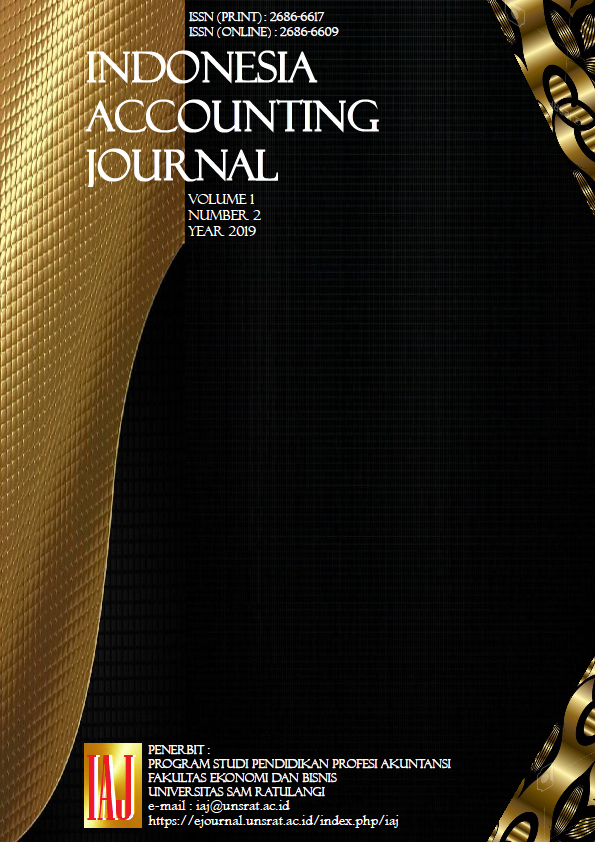Pengaruh kepemilikan NPWP terhadap kepatuhan wajib pajak pada Kantor Pelayanan Pajak Pratama Manado
DOI:
https://doi.org/10.32400/iaj.26638Keywords:
tax-payers, compliance, NPWP, income taxAbstract
Income tax can be used for various functions of determining policies related to income. Taxpayer compliance is strongly influenced by the ownership of a country's NPWP because if a Taxpayer is not compliant it will cause reduced tax revenue. The object of this research is the Income Taxpayer which is limited to the Corporate Income Taxpayer in the city of Manado. The purpose of this study is to determine whether NPWP ownership has an effect on tax compliance at the Manado Primary Tax Service Office. In conducting this research a statistical analysis tool is used that is simple linear regression analysis and is strengthened by testing the hypothesis that is the t test. The results showed the regression model obtained was Y = 10.895 + 0.299 X. The constant a of 10.895 gives the sense that if the Income Tax Audit is perceived to be constant or equal to zero (0), then the magnitude of Taxpayer Compliance is 10.895 units. Furthermore, the value of b which is a regression coefficient of variable X (NPWP ownership) of 0.299 means that if NPWP ownership has increased by one (1) unit, then the amount of income tax increase has increased or increased by 0.299 units assuming the other variables are fixed or constant. Taxpayers compliance (Y) got contribution from NPWP (X) ownership factor of 6.6%, while the rest was explained by other variables not included in this study. Thus it is known that NPWP ownership has no significant effect on increasing taxpayer compliance.
References
Dharmayanti, N., & Humayroh, S. A. (2019). Pengaruh NPWP dan sanksi perpajakan terhadap kepatuhan wajib pajak (Studi Kasus Civitas Akademika Universitas Islam Syekh-Yusuf Tangerang). Ekonomi Bisnis, 25(1), 32-46. https://doi.org/10.33592/jeb.v25i1.286
Diana, A., & Setiawati, L. (2009). Perpajakan Indonesia. Yogyakarta: Penerbit Andi.
Gunawan, N. A. (2016). Pengaruh Kepemilikan NPWP, Pengetahuan Wajib Pajak, dan Sanksi Pajak terhadap Kepatuhan Wajib Pajak Orang Pribadi (Studi Kasus pada KPP Pratama Bandung Bojonagara). Skripsi: Universitas Kristen Maranatha. https://repository.maranatha.edu/21667/
Ernawati, E., Yuniati, Y., & Rustandi, R. (2019). Pengaruh pengetahuan pajak dan kepemilikan NPWP terhadap kepatuhan wajib pajak orang pribadi melalui religiusitas sebagai variabel intervening. Jurnal Ilmiah MEA (Manajemen, Ekonomi, & Akuntansi), 3(2), 121-133. http://journal.stiemb.ac.id/index.php/mea/article/view/178
Jannata, R. A., Nurhayati, N., & Halimatusadiah, E. (2019). Pengaruh kewajiban kepemilikan NPWP dan pemeriksaan pajak terhadap ukuran penerimaan pajak penghasilan badan (Survey pada seluruh petugas pajak di Kantor Pelayanan Pajak Pratama Soreang). Kajian Akuntansi, 20(1), 58-64. https://doi.org/10.29313/ka.v21i2.4502
Mardiasmo. (2011). Perpajakan, Edisi Revisi. Yogyakarta: Penerbit Andi.
Pamber, S. (2016). Pengaruh kepemilikan NPWP, pemeriksaan pajak dan penagihan pajak terhadap penerimaan pajak (Studi pada Kantor Pelayanan Pajak Pratama Pekanbaru Tampan). Jurnal Mahasiswa Prodi Akuntansi Fakultas Ekonomi, 2(2), 1-14. http://e-journal.upp.ac.id/index.php/akfekon/article/view/968
Peraturan Menteri Keuangan (PMK) Nomor 101/PMK.010/2016 tentang Penyesuaian Besarnya Penghasilan Tidak Kena Pajak.
Resmi, S. (2014). Perpajakan Teori dan Kasus Edisi 4. Jakarta: Salemba Empat.
Riesvie, A. (2016). Pengaruh kemanfaatan NPWP, pemahaman wajib pajak, kualitas pelayanan, dan sanksi perpajakan terhadap kepatuhan wajib pajak orang pribadi di KPP Pratama Batu. Skripsi: Jurusan Akuntansi Fakultas Ekonomi Universitas Negeri Malang. http://akuntansi.fe.um.ac.id/en/index.php/2016/08/30/pengaruh-kemanfaatan-npwp-pemahaman-wajib-pajak-kualitas-pelayanan-dan-sanksi-perpajakan-terhadap-kepatuhan-wajib-pajak-orang-pribadi-di-kpp-pratama-batu/
Simanungkalit, A., Poputra, A., & Runtu, T. (2015). Pengaruh kewajiban kepemilikan NPWP, pemeriksaan pajak dan penagihan pajak terhadap penerimaan pajak (Studi Kasus pada KPP Pratama Bitung). Going Concern : Jurnal Riset Akuntansi, 10(4), 1-9. https://doi.org/10.32400/gc.10.4.10514.2015
Tansuria, B. I. (2010). Pokok-Pokok Ketentuan Umum Perpajakan, Edisi Pertama. Yoyakarta: Graha Ilmu.
Undang-Undang Nomor 28 Tahun 2007 tentang Ketentuan Umum dan Tata Cara Perpajakan.
Waluyo dan Ilyas, W. B. (2009). Perpajakan Indonesia. Jakarta: Salemba Empat.
Yuliyanti, C. D. (2018). Pengaruh kemanfaatan NPWP, pemahaman wajib pajak, dan kesadaran wajib pajak terhadap kepatuhan wajib pajak (Studi Kasus UMKM di Kota Surakarta). Skripsi: Program Studi Akuntansi Jurusan Pendidikan Akuntansi Fakultas Ekonomi Universitas Negeri Yogyakarta. http://eprints.uny.ac.id/62164/1/R.%20A.%20CITRA%20DEWI%20YULIYANTI.pdf
Downloads
Additional Files
Published
Issue
Section
License
The articles published in Indonesia Accounting Journal are licensed under Creative Commons Attribution 4.0 International License with authors as copyright holders.
Â

This work is licensed under a Creative Commons Attribution 4.0 International License.
Â
Under this license then authors free to:
- Share — copy and redistribute the material in any medium or format.
- Adapt — remix, transform, and build upon the material for any purpose, even commercially.
Under the following terms :
- Attribution — You must give appropriate credit, provide a link to the license, and indicate if changes were made. You may do so in any reasonable manner, but not in any way that suggests the licensor endorses you or your use.
- No additional restrictions — You may not apply legal terms or technological measures that legally restrict others from doing anything the license permits.
Notices:
- You do not have to comply with the license for elements of the material in the public domain or where your use is permitted by an applicable exception or limitation.
- No warranties are given. The license may not give you all of the permissions necessary for your intended use. For example, other rights such as publicity, privacy, or moral rights may limit how you use the material.


